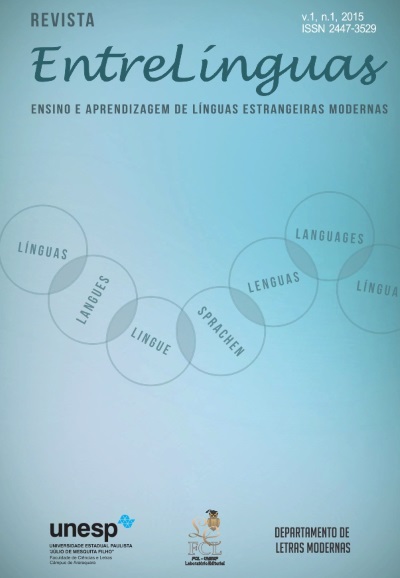The notion of intercultural and teaching-learning process of foreign languages in Brazil: representations and realities of FFL
DOI:
https://doi.org/10.29051/el.v1i1.8055Keywords:
Intercultural, Foreign Languages, Methodology, Representation, FFL, Literacy,Abstract
Although the history of humanity is merged with the history of languages, studies related to the field of language sciences have been very recent. Several elements compose the broad field of human sciences, such as behavioral analysis and the sense of belonging and exclusion. Situated in this context, the epistemological reflection about Foreign Languages (FL) represents a sign of contemporaneity. This fact is maximized by its interdisciplinary character, making the lines that delimit the linguistic field research in FL very tenuous. The degree of variants of the object Language makes the research on teaching and learning highly complex due to the subjectivity it involves. Therefore, it is necessary to discuss issues such as representation and interculturalism in the research methodology. Such dimension allows some outlines for the development of linguistic research to be drawn, establishing an interface with the process of teaching and learning in FL. Cuq (2010), Puren (2009), Courtillon (1998) and De Carlo (1998) are some of the theoretical references on which this reflection is based on. Some representations related to literacy will be pointed out in order to highlight aspects related to the reality of current teaching of French as a Foreign Language (FFL) in Brazil.
Downloads
Downloads
Published
How to Cite
Issue
Section
License
Os manuscritos aceitos e publicados são de propriedade da Revista EntreLínguas. Os artigos publicados e as referências citadas na Revista EntreLínguas são de inteira responsabilidade de seus autores.
Transferência de direitos autorais – autorização para publicação
Caso o artigo submetido seja aprovado para publicação, já fica acordado que o(s) autor(es) autoriza(m) a UNESP a reproduzi-lo e publicá-lo na EntreLínguas, entendendo-se os termos “reprodução” e “publicação” conforme definição respectivamente dos incisos VI e I do artigo 5° da Lei 9610/98. O artigo poderá ser acessado pela rede mundial de computadores (Internet), sendo permitidas, a título gratuito, a consulta e a reprodução de exemplar do artigo para uso próprio de quem a consulta, desde que haja a citação ao texto consultado. Essa autorização de publicação 328 EntreLínguas, Araraquara, v. 1, n .2, p. 323-328, jul./dez. 2015 não tem limitação de tempo, ficando a UNESP responsável pela manutenção da identificação do(s) autor(es) do artigo. Os artigos publicados e as referências citadas na Revista EntreLínguas são de inteira responsabilidade de seus autores.











